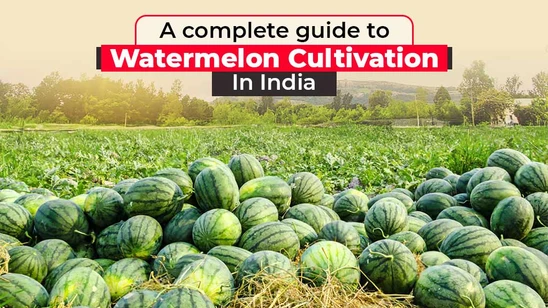Organic Farming in India - Meaning, Types and Benefits

Table of Contents
- What is Organic Farming?
- What is the Need for Organic Farming in India?
- What is the Present Scenario of Organic Farming in India?
- What are the Different Types of Organic Farming?
- What are the Organic Farming Methods?
- What are the Benefits/Pros of Organic Farming?
- What are the Limitations of Organic Farming?
- What are the Government Efforts to Promote Organic Farming?
- Is Organic Farming Profitable in India?
What is Organic Farming?
Organic farming is a farming method that uses natural fertilisers such as organic manure, compost, and bio-fertilizers to grow crops and uses bio-pesticides to protect the plants from pests. It uses methods like crop rotation, polyculture, organic manures, and natural pest management to grow crops in an eco-friendly manner. The objective is to maintain soil health and preserve the environment. It is also known as eco-farming, green farming, biological farming, or ecological farming.
What is the Need for Organic Farming in India?
The need for organic farming in India is to:
- Protect and preserve the environment.
- Prevent soil degradation and maintain soil health.
- Preserve helpful organisms.
- Reduce the emergence of new pests and diseases.
- Protect human health by producing quality food for human consumption.
Today, organic farming is a solution to growing crops without harming the environment or human health.
What is the Present Scenario of Organic Farming in India?
According to FiBL survey 2021 India holds a unique position among 187 countries practicing organic agriculture. India has 30% of total organic producers in the world which is 2.30 million hectares.
According to NPOP 2022-23 data, India has 1764677.15 hectares of organic farming land, 3627115.82 hectares of organic farming land that is being converted, and 4780130.56 hectares of wild harvest area. The top states are Madhya Pradesh, Maharashtra and Gujarat.
What are the Different Types of Organic Farming?
Two types of organic agriculture are widely practiced across the country: pure organic farming and integrated organic farming.
Pure Organic Farming
Pure organic farming completely avoids using inorganic farming inputs like chemical fertilizers and pesticides. Instead, it focuses on growing crops using organic manure and bio-pesticides.
Integrated Organic Farming
It is a cyclical and zero-waste process in which the waste generated from one method is a nutrient or raw material for another process. In this type, integrated nutrient management and integrated pest management are combined to achieve a balance between ecology and economic demand.
What are the Organic Farming Methods?
Various organic farming methods are crop rotation, organic manures and compost use, diverse crop selection, natural pest and disease management, and organic livestock integration. Let us see these methods briefly in the sections below.
Zero Budget Natural Farming (ZBNF)
Zero Budget Natural Farming (ZBNF) involves raising crops without using any fertilizers, pesticides or any other external materials. Zero budget refers to the zero cost of production of all crops. It is a sustainable farming method that increases soil fertility and lowers production costs, helping farmers increase their income.
Crop Rotation
The crop rotation method involves growing different crops on the same piece of land according to different seasons. It helps maintain soil health and fertility, prevents the growth of insects and pests, and effectively controls weeds.
Organic Manures and Compost
This method uses organic manures and compost to add essential nutrients to the soil. Organic manures are natural fertilizers derived from plant and animal residues. On the other hand, compost is a recycled organic fertilizer created by mixing plant leftovers, kitchen waste, and other organic matter.
Diverse Crop Selection
One effective method of organic farming is crop diversity, also known as 'Polyculture'. This method involves cultivating different crops concurrently to reduce the crops' vulnerability to specific pests and diseases and support the ecosystem.
Natural Pest and Disease Management
It involves using natural methods and beneficial insects to control pests and diseases. It obliterates the need for chemical pesticides.
Organic Livestock Integration
It involves integrating livestock farming with crop farming. In recent years, the Indian Council of Agricultural Research (ICAR) has been promoting this agricultural production system in regions with potential for organic farming.
Infographic: All the organic farming methods mentioned above.
What are the Benefits/Pros of Organic Farming?
- Organic farming is environmentally friendly and a sustainable agricultural practice.
- It is healthy for humans as organic produce is devoid of toxic chemicals.
- This farming method helps maintain soil fertility and health.
- It helps to lower production costs and enhances farmers' income.
- It helps promote biodiversity as it is beneficial for insects and micro-organisms in soil.
What are the Limitations of Organic Farming?
- In the initial years, high input costs and low yield are the main limitations of organic farming.
- Lack of knowledge about organic production, processing, transportation, certification, etc.
- Obtaining certification for organic produce is lengthy and entails high costs.
- Marketing and distribution of organic produce is comparatively inefficient and costly compared to inorganic farming.
What are the Government Efforts to Promote Organic Farming?
The Indian government has undertaken efforts to promote organic farming across the length and breadth of the country since 2015-16. To this end, it has launched several schemes and programmes.
Paramparagat Krishi Vikas Yojana (PKVY)
Paramparagat Krishi Vikas Yojana (PKVY) was launched in 2015 as a comprehensive scheme for promoting organic farming in India through a cluster approach. It seeks to motivate farmers to take up organic farming. For this, it entails the following:
- It aims to mobilize farmers to form a cluster comprising 50 members and covering a land of 20 hectares or 50 hectares.
- The clusters will help farmers adopt Participatory Guarantee System (PGS) based certification for organic produce so that they can market their products locally.
- It provides financial assistance of INR 50,000 per hectare to farmers within a cluster up to a maximum of 1 hectare.
- Make farmers aware of organic inputs such as Panchagavya and Jeevamruth and ensure that they adopt these inputs.
Since 2015-16, an area of 11.85 lakh ha has been brought under organic farming through PKVY scheme and Government also intend to another 6.00 lakh ha area to organic through PKVY during the period from 2022-23 to 2025-26.
Mission Organic Value Chain Development for the North-Eastern Region (MOVCDNER)
The Central Government launched the Mission Organic Value Chain Development for the North-Eastern Region (MOVCDNER) in 2015. It aims to develop certified organic production in the value chain through:
- Empowering 30,000 – 50,000 farmers in the region through the creation of 100 FPOs.
- Bringing 50,000 hectares under organic farming in the North-Eastern region of India.
Under this scheme:
- Assistance of Rs. 46,500/ha for 3 years is provided for creation of FPO, support to farmers for organic inputs, quality seeds/ planting material and training, hand holding and certification.
- Out of this, assistance @ Rs. 32,500/ ha for 3 years is provided to farmers for off -farm /on –farm organic inputs under the scheme including Rs. 15,000 as DBT to the farmers and Rs. 17,500 for the planting material to be given to the farmers.
National Programme for Organic Production (NPOP)
The Ministry of Commerce launched the National Programme for Organic Production (NPOP) in 2001. It lays down the process for obtaining certification for organic products.
The key objectives are:
- Provide a platform to evaluate the certification of organic produce.
- Recognize certification programmes of bodies seeking accreditation.
- Facilitate certification of organic products in accordance with the approved standards.
- Promote organic farming and organic processing in the country.
Is Organic Farming Profitable in India?
As per the All-India Network Project on Organic Farming (AI-NPOF), organic farming is profitable, sustainable, and productive compared to inorganic farming. Some of the findings are:
- The yield with organic farming was higher for cereals, oilseeds, and vegetables when compared to inorganic farming.
- Despite high cultivation costs, the net return was highest in 63% of the crops grown with an organic approach.
- The use of low-cost, eco-friendly bio-fertilizers makes organic farming a low-cost alternative to chemical methods.
Frequently Asked Questions On Organic Farming in India - Meaning, Types and Benefits
1. What is organic farming?
Organic farming involves the use of organic manure and bio-compost for growing crops. It avoids the use of synthetic fertilizers and pesticides.
2. What are the advantages of organic farming?
Organic farming promotes biodiversity, produces quality crops for human consumption, maintains soil fertility and health, and is environment-friendly.
3. Who is the father of organic farming?
Sir Albert Howard is the father of organic farming.
4. What are some examples of organic farming in India?
Zero Budget Natural Farming (ZBNF), Crop Rotation and, Organic Manures and Compost are some of the examples of organic farming.
5. Is organic farming profitable in India?
Organic farming is profitable, sustainable, and productive compared to inorganic farming due to higher yield, low cultivation costs, and an environmentally friendly approach to agriculture.


Related Blogs















